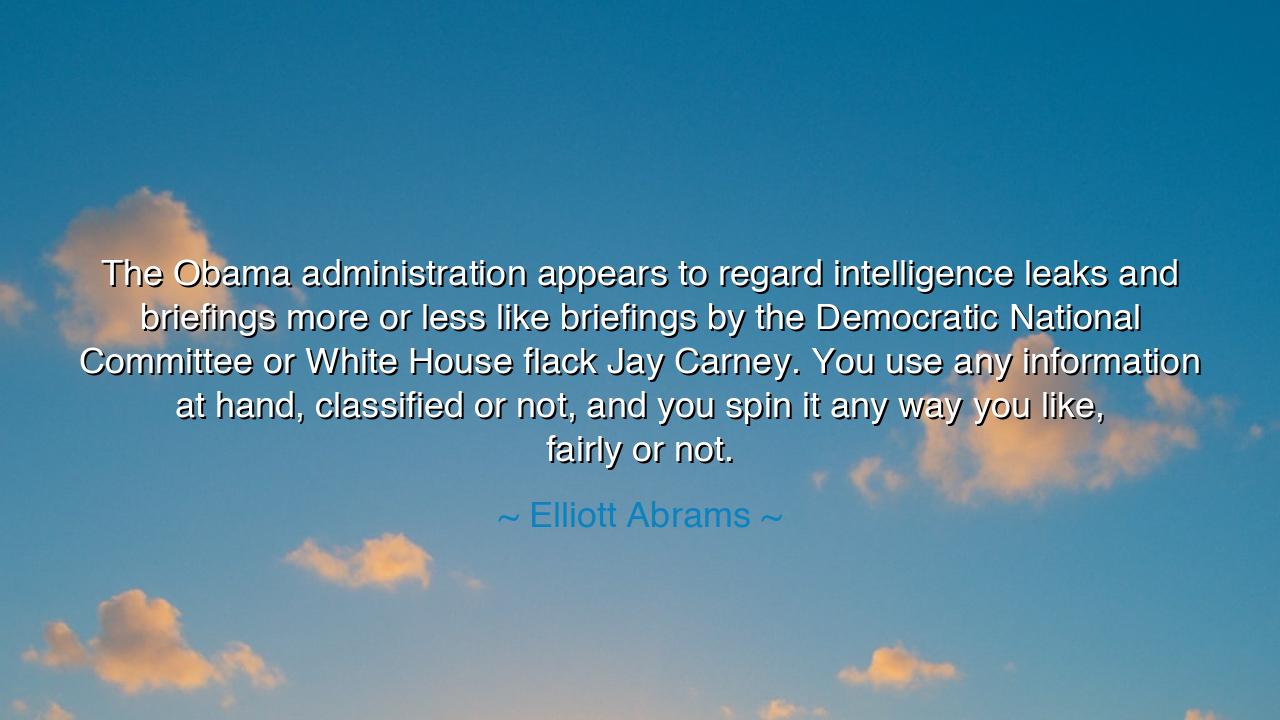
The Obama administration appears to regard intelligence leaks and
The Obama administration appears to regard intelligence leaks and briefings more or less like briefings by the Democratic National Committee or White House flack Jay Carney. You use any information at hand, classified or not, and you spin it any way you like, fairly or not.






“The Obama administration appears to regard intelligence leaks and briefings more or less like briefings by the Democratic National Committee or White House flack Jay Carney. You use any information at hand, classified or not, and you spin it any way you like, fairly or not.” – Elliott Abrams
Hear now, O student of truth and governance, the stern warning that lies hidden in these words of Elliott Abrams, a man seasoned in the corridors of power, who has seen how nations rise upon truth and fall upon deceit. His words speak not merely of one administration, nor of one moment in history, but of a danger that has haunted rulers since the dawn of states—the corruption of intelligence, the twisting of knowledge for political gain. When he declares that information is “spun” rather than spoken, he laments the decay of integrity in leadership, when the sacred duty to inform becomes the cunning art to manipulate.
For what is intelligence, but the gathering of truth in the service of wisdom? It is the light that guides the ship of state through the fog of uncertainty. But when this light is turned toward the purpose of vanity or ambition—when it is used not to reveal, but to conceal—then truth itself becomes the servant of deceit. Abrams warns that to treat intelligence as propaganda is to betray the very essence of governance. For the ruler who sees truth only as a tool of convenience will soon lose the trust of the governed, and with that trust, the foundation of his power.
This is not a new sin, but an ancient one. Consider Emperor Nero, who in Rome’s burning hour sought not to understand what had gone wrong, but to mold the story to his advantage. He blamed the innocent, crafting lies to preserve his image. The information at hand, though plain to all, was distorted to fit his purpose. His deceit bought him time, but not peace. For in the end, the flames that devoured his city also consumed his honor. Thus it has ever been: when leaders spin truth, they may triumph in the moment, but they are undone in the ages that follow.
So too in our own era, Abrams decries the practice of politicizing intelligence—of using the sacred trust of classified knowledge as though it were a tool of party politics. In his words, we hear the voice of one who has served behind closed doors, who knows that truth is fragile, and that when it is treated lightly, it shatters easily. When officials speak not as servants of the people but as spinners of narratives, they transform governance into theater. The audience may applaud for a time, but the stage itself—reality—cannot be rewritten. To bend truth for advantage is to build a fortress of sand.
There is in his critique a moral depth that echoes the wisdom of the ancients. For truth is not the property of kings, nor the weapon of factions—it is the common inheritance of all humanity. A government that conceals or distorts truth commits a sin not only against its citizens but against the very principle of order. In the teachings of Confucius, we are told that the foundation of harmony is the rectification of names—that things must be called by their proper names, and that speech must align with reality. When words are twisted, when lies are dressed as facts, the order of the world itself begins to crumble.
Yet even amid this warning, Abrams’s words call for vigilance, not despair. For the guardians of truth are not only those in power, but all who bear witness. It is the duty of citizens to demand integrity, of journalists to question, of advisors to speak courageously. To accept the “spin” of half-truths without discernment is to partake in the corruption of knowledge. The wise do not swallow words whole—they weigh them, test them, and hold them to the light of reason. For the health of a republic depends not on perfect rulers, but on a people who refuse to be deceived.
So let this be your lesson, O listener of ages: seek truth unshaped by favor, and speak it without fear. Beware those who twist words to win applause, for they trade in illusion, not wisdom. When you lead, whether in great halls or small households, let your speech be plain and your purpose pure. For truth, once broken, cannot easily be repaired—and a nation that forgets this will stumble in its blindness.
Thus, in the voice of Elliott Abrams, we hear an ancient truth revived for modern ears: the power of truth is sacred, and its distortion is sacrilege. The wise ruler does not spin the truth—he serves it. The just nation does not hide from knowledge—it thrives upon it. And the people who cherish truth above convenience shall endure, long after the flatterers and deceivers have faded into dust.






AAdministratorAdministrator
Welcome, honored guests. Please leave a comment, we will respond soon